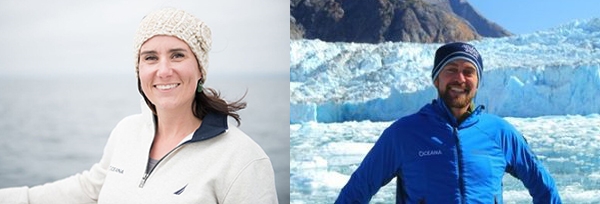From Deep-Sea Corals to Whales: Oceana Conservation Successes in the U.S. Pacific
–
McGowan MG102McGowan Building
411 Pacific St
Monterey, CA 93940 View in Campus Map
Free
Open to the Public

(Credit: Photographer Jason Bradley )
Experts from Oceana’s California office in Monterey will describe two US West Coast case study campaigns to protect seafloor habitats from fishing impacts and prevent whale and sea turtle entanglements in fishing gear.
From Deep-Sea Corals to Whales: Oceana Conservation Successes in the U.S. Pacific
Speakers: Ashley Blacow-Draeger, Pacific Policy and Communications Manager, Oceana
Geoff Shester, Ph.D., California Campaign Director and Senior Scientist, Oceana
Monday, December 2, 2024
6:00pm to 7:30pm
In-person event
McGowan Building, Room 102
411 Pacific Street, Monterey, CA 93940
About the Topic
The oceans face a gauntlet of threats which are becoming more complex with a changing climate. Oceana looks at the major problems facing the oceans and analyzes the science and data underlying those problems to determine what policies are needed to meet our objective of a healthy and abundant ocean. As a campaign-based advocacy organization, Oceana uses science, economics, law, public engagement targeted at key decision-makers to strategically achieve durable policy victories at the state and federal level.
Oceana is an international non-profit organization dedicated to protecting the world’s oceans. Through science-based advocacy, grassroots organizing, strategic communications, and legal pressure, Oceana has helped secure victories benefiting ocean ecosystems and people who rely on them.
About the Speakers
Ashley Blacow-Draeger, Oceana Pacific Policy and Communications Manager
Ashley focuses on the intersection of policy and public engagement to protect and restore biodiversity within the California Current Ecosystem off the U.S. West Coast.
In this role, she campaigns to protect habitat, address overfishing, reduce fishery bycatch, protect threatened and endangered species, and curb plastic pollution.
Prior to joining Oceana in 2010, her experience includes positions as an environmental planner, teacher, and Sea Grant Fellow with the California Natural Resources Agency.
She holds a B.S in Aquatic Biology and a minor in Professional Writing from the University of California Santa Barbara and a M.A. in International Environmental Policy from the Monterey Institute of International Studies.
Geoff Shester, Ph.D., Oceana California Campaign Director and Senior Scientist
Geoff is Oceana’s California Campaign Director based in Oceana’s Monterey office and working with Oceana’s Pacific Team.
After completing a double major in Biology and Environmental Studies at the University of California, Santa Cruz, Geoff Shester interned for the Exxon Valdez Restoration Office in Anchorage, Alaska and then landed his first big job at Oceana’s first field office located in Juneau, Alaska in 2002.
He earned his doctorate in the Stanford University Interdisciplinary Program in Environment and Resources out of Hopkins Marine Station in Monterey, studying the interplay between marine ecology and the economics of small-scale fisheries in Baja California. He was the Senior Science Manager at the Monterey Bay Aquarium Seafood Watch Program from 2008-2010, where he led a team of scientists responsible for evaluating the sustainability of hundreds of types of wild and farmed seafood.
Since coming onboard at Oceana in 2002, he co-authored and advocated for proposals that ultimately led to the largest suite of seafloor habitats protected from trawling in North America, totaling over 1,000,000 square miles of marine protected areas from the Mexican border to the Arctic. He also served as the Expedition leader and co-leader for Oceana’s U.S. West Coast undersea expeditions in 2010, 2011, 2013, and 2016, which gathered footage of never-before-seen seafloor habitats with remotely operated vehicles. He currently works on Oceana’s US West Coast campaigns to implement ecosystem-based management of forage fish, protect seafloor habitats from bottom trawling, and reduce fisheries bycatch.
Recommended Reading
- Whale Safe Oceans: Preventing Entanglements off the U.S. West Coast
- A Win-Win for Deep-Sea Corals and Fishing: Increasing Seafloor Protections While Restoring Fishing Opportunities Off the United States West Coast
Event Location: McGowan Building, Room 102
The McGowan Building is located at 411 Pacific Street, Monterey, CA, 93940, on the campus of the Middlebury Institute of International Studies. Attendees should enter through the glass doors from Pacific Street, and the MG102 is located inside to the right. View the campus map.
No Zoom this fall, but most lectures recorded
This fall, all classes are back 100% in-person, and our lecture series has followed suit. Zoom will not be an option for public participation, but in-person attendees are certainly welcome. Can’t make it in person? No problem! Most lectures will be recorded (as permitted by our speakers) and the videos uploaded to the CBE YouTube, with a link added to each event announcement as it becomes available.
Parking
Parking is available in any Middlebury Institute campus lot after 5 p.m., no parking permit required, no fee. View the campus map. (be sure to not confuse city lots with campus lots—city lots do charge a fee). Free parking is also available on the street (time limits on surrounding streets end at 6 p.m.).
Questions
Contact Rachel Christopherson at the Center for the Blue Economy at cbe@miis.edu or (831) 647-4183.
Gratitude to Our Sponsors
We thank the Loker Hicks Foundation and the Nancy Eccles and Homer M. Hayward Family Foundation our sponsors.
About the Host
The Center for the Blue Economy is a research center at the Middlebury Institute of International Studies, that provides economic and policy analysis to support the development of a robust and equitable blue economy for the 21st century. The Center uses the World Bank’s definition of the Blue Economy: the sustainable use of ocean resources for economic growth, improved livelihoods and jobs, and ocean ecosystem health. We must maintain ocean health to maintain human health, economic health, and the health of the planet. Climate change is linked, inextricably, to a healthy ocean. We are co-leading a movement for Ocean Climate Action Now. Consider joining our Center for the Blue Economy Newsletter List (3-4x per year by email).
